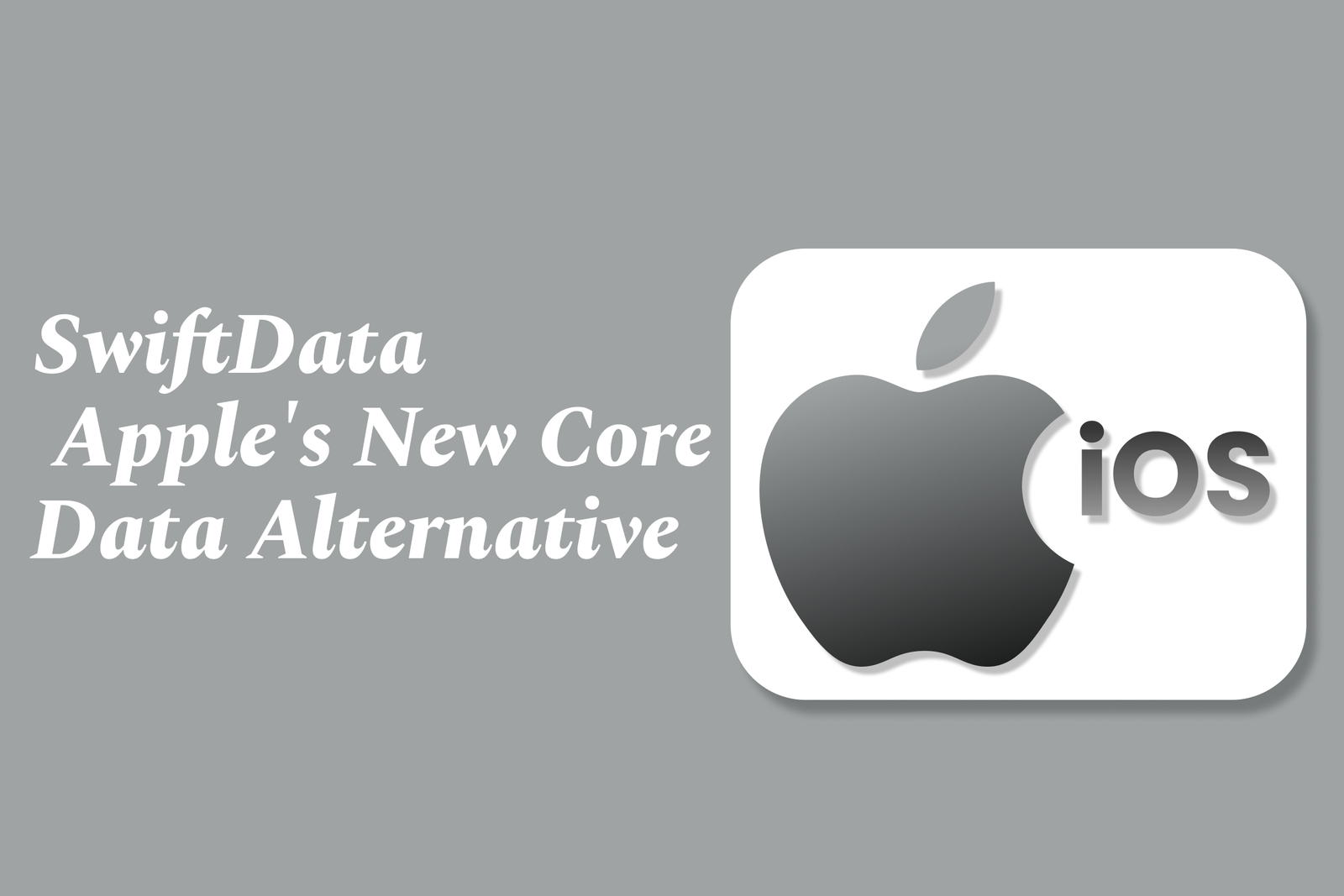SwiftData: Apple's new Core Data alternative
SwiftData is Apple’s modern persistence framework introduced as a streamlined, SwiftUI-friendly alternative to Core Data. It simplifies local data storage with a clean, declarative Swift API, making data management easier and more intuitive for Swift developers.
SwiftData: Apple's New Core Data Alternative
1 ) Introduction to Persistent Local Storage in Swift Apps
Developers often require persistent local storage solutions when building apps, and Apple has historically provided Core Data as the primary framework for this purpose. However, with the introduction of SwiftData in 2023, Apple offers a modern, Swift friendly alternative aiming to simplify and enhance data management, especially for SwiftUI based applications.
2 ) Core Data Overview
Mature and Powerful: Core Data has been Apple's flagship local data framework for over 15 years, providing powerful object graph management and persistence capabilities.
Strengths:
Handles complex object relationships efficiently.
Supports large data volumes with properly designed concurrency management.
Offers robust migration tools to upgrade databases alongside app evolution.
Drawbacks:
Steep learning curve due to complexity.
Requires extensive boilerplate code.
Multithreading safety demands strict adherence to rules.
Poor integration with SwiftUI, leading to cumbersome developer experiences.
3 ) Introducing SwiftData
Modern and SwiftUI Friendly: Released at WWDC 2023, SwiftData leverages a declarative, Swift centric API that integrates seamlessly with SwiftUI, making it easier to create and manage data models.
Simplified Experience: It reduces boilerplate, allowing developers to work more intuitively with data persistence. SwiftData is designed to suit smaller projects as well as applications requiring straightforward data management without complex overhead.
Concurrency and Publisher Support: SwiftData accommodates SwiftUI's reactive paradigms and publisher patterns, facilitating smooth multi threading and updates.
4 ) Why Choose SwiftData?
Alignment with Apple's Ecosystem: Using SwiftData ensures better long term compatibility with Apple platforms as the framework evolves alongside hardware and OS updates.
Ease of Adoption with SwiftUI: SwiftData is built with SwiftUI in mind, offering a natural fit for apps employing Apple's declarative UI framework.
Future Oriented: SwiftData embraces modern Swift language features and development patterns for improved maintainability.
5 ) Challenges When Choosing Apple’s Persistence Frameworks
Apple API Abstractions: Developers must be prepared to navigate Apple's abstractions, which sometimes obscure underlying complexities or change unexpectedly.
Documentation and Community Support: While Apple has improved documentation, some APIs still lack comprehensive guidance, especially for advanced applications or edge cases.
Potential for API Soft Abandonment: As seen with other Apple frameworks, the risk exists that APIs may receive diminishing updates or support.
6 ) Community Insights and Alternatives
Many developers find Core Data complex and error prone, especially when dealing with concurrency and SwiftUI integration.
SwiftData offers promise but is still a young framework, prompting some to retain Core Data for its maturity or explore third party alternatives like Crush or direct SQLite handling.
Discussions highlight the desire for open source frameworks to improve transparency and collaborative development, something Apple’s proprietary model currently limits.
7 ) Conclusion: Core Data vs SwiftData for 2025
Core Data remains the battle tested, robust choice for complex, data intensive applications requiring mature tooling and extensive community resources.
SwiftData is ideal for developers seeking a modern, SwiftUI optimized, and less complex persistence framework, especially suitable for small to medium sized projects.
Developers should weigh project requirements, team expertise, and long term maintenance plans when choosing between the two.
Summary:
SwiftData represents Apple's strategic move toward simplifying local data persistence with a Swift first, SwiftUI friendly API. While it lowers the barrier for developers new to persistence and complements modern app architectures, Core Data’s maturity and power keep it relevant, especially for complex apps. Understanding both frameworks enables developers to select the best tool for their needs in 2025 and beyond.
https://justacademy.in/news-detail/how-react-native-is-leading-the-way-in-accessibility-features
https://justacademy.in/news-detail/freelancing-with-flutter-in-2025
https://justacademy.in/news-detail/android-system-update-statistics
https://justacademy.in/news-detail/android-smart-home-integration-updates
https://justacademy.in/news-detail/react-native?s-new-code-splitting-techniques
Related Posts
Java supports GDPR and data privacy by enabling secure data handling through encryption, controlled access, and precise data management. It allows developers to minimize PII exposure, ensure data confidentiality, and design workflows that comply with data protection regulations effectively.
Java code quality tools have evolved to include advanced static analysis, integrated security checks, and AI-powered code reviews. These updates help developers detect bugs, enforce coding standards, and enhance security, streamlining the development process and improving overall code reliability.
Java remains a cornerstone in big tech companies, evolving with modern features like records, pattern matching, and virtual threads. Its robust ecosystem, enhanced performance, and growing AI integrations keep it vital for both legacy systems and innovative new projects.
Java and CI/CD pipeline optimizations streamline Java application development by automating builds, tests, and deployments. They improve efficiency through parallelization, caching, and secure secrets management, enabling faster feedback loops and more reliable, scalable software delivery.
Java supports modern cryptography standards through its flexible Java Cryptography Architecture (JCA), enabling integration of advanced algorithms like AES, EdDSA, and post-quantum tools. Libraries like Bouncy Castle offer FIPS-certified, hardware-accelerated implementations for secure development.
Java 23 enhances record patterns by enabling concise, direct destructuring of record components within pattern matching, simplifying type checks and data extraction. This improvement boosts code readability and expressiveness by reducing boilerplate in handling immutable data classes.
Java remains a top choice for mobile app backends, powering scalable, secure, and high-performance server-side solutions. Latest trends include cloud-native microservices, reactive programming, and enhanced JVM optimizations, enabling efficient, flexible, and robust mobile backend development.
Java SE 24 and LTS Java SE 21 offer enhanced features and performance, while Apache Spark 4.0.0 introduces Scala 2.13 support and advanced ML and SQL capabilities. Together, they empower developers to build scalable, high-performance data applications with modern tools.
JUnit 5 modernizes Java testing with a modular architecture, improved assertions, and seamless Java 8+ support. Beyond JUnit, tools like Mockito and AssertJ enhance mocking and assertions, creating a powerful, flexible ecosystem for writing clean, efficient Java unit tests.
Java plays a pivotal role in cloud automation tools by providing a robust, platform-independent language used to build scalable automation frameworks like Jenkins and Selenium, enabling efficient CI/CD pipelines, testing, and orchestration across diverse cloud environments.










